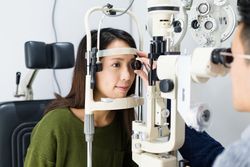
Not everyone knows that people with diabetes have particular eye care needs. One of the issues of which they must be vigilant is diabetic retinopathy. If you or a loved one is diabetic, it’s important to find out all you can about this condition so that you can combat it as early and effectively as possible. Below, learn what this eye problem entails and how it can be treated.
What Causes Diabetic Retinopathy?
As diabetes progresses and causes persistently high glucose levels, the sugar acts as an obstacle to the small blood vessels in the light-detecting tissue of the retina. The vessels become weak and damaged, and the eyes make faulty new vessels that sometimes hemorrhage. As a result, a person’s vision may suffer only mildly or become lost altogether. It can happen to people with either type 1 or type 2 diabetes, especially if they’ve had the disease for a long time or have not maintained tight control over their blood sugar levels.
What Are the Early Symptoms & Later Consequences?
 At first, the person may not notice anything wrong. They may have blurry vision or trouble seeing anything far away, but so do many people without diabetes. Diabetic retinopathy starts manifesting itself more clearly in dark, floating spots that appear stringy or web-like. Some parts of their vision may be completely dark. Sometimes, eye fluid will leak from the retina or find itself blocked from draining at all, which are conditions known as diabetic macular edema and neovascular glaucoma, respectively. It’s imperative to seek eye care from an eye doctor immediately when these symptoms arise so that total blindness may be averted.
At first, the person may not notice anything wrong. They may have blurry vision or trouble seeing anything far away, but so do many people without diabetes. Diabetic retinopathy starts manifesting itself more clearly in dark, floating spots that appear stringy or web-like. Some parts of their vision may be completely dark. Sometimes, eye fluid will leak from the retina or find itself blocked from draining at all, which are conditions known as diabetic macular edema and neovascular glaucoma, respectively. It’s imperative to seek eye care from an eye doctor immediately when these symptoms arise so that total blindness may be averted.
How Can It Be Treated or Prevented?
At this time, there is no known cure for diabetic retinopathy, so the vision loss is permanent. However, there are a few eye care treatments that can keep the person from going completely blind, including laser or vitrectomy surgery. If a diabetic person makes an effort to exercise regularly, eat healthily, avoid tobacco, use insulin or other diabetic medication recommended by their primary care doctor, and see an optometrist for annual eye exams, they’re more likely to prevent it from becoming a problem in the first place.
Any person who has diabetes and is concerned about developing diabetic retinopathy can find quality eye care with Kenneth Houchin MD at the Vegas Valley Eye Center in Las Vegas, NV. He provides detailed analyses of your eye health and creates personalized treatment plans for every patient. He’s also an expert at helping patients cope with eye conditions caused by other problems, like brain tumors, strokes, and multiple sclerosis. Find out more about the specialized treatment he can offer by calling (775) 738-5193 or checking him out online.
About the Business
Have a question? Ask the experts!
Send your question

